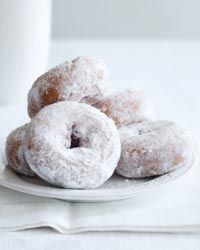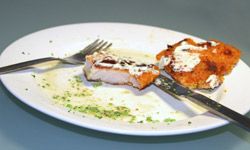 “Is it necessary to skip dessert if you’d like to lose weight? See more pictures of enlightened desserts.picturegarden/Getty Images
“Is it necessary to skip dessert if you’d like to lose weight? See more pictures of enlightened desserts.picturegarden/Getty Images
Life is short and uncertain, and eating dessert, whether it comes first, last or somewhere in between, can make mealtime matter in a gratifying way. A big bowl of greens doesn’t hold quite the same appeal as a wedge of pie, a slice of cake or a bowl of ice cream. Can the words "dessert" and "diet" live happily in the same food journal entry? Well, the short answer is yes, but there are a few important limitations you need to keep in mind.
Every five years, the U.S. Department of Health and Human Services (HHS), in conjunction with the U.S. Department of Agriculture (USDA), produces dietary recommendations for all Americans. This information is based on solid science and takes a practical approach to maintaining a healthy diet and weight. It doesn’t exclude or limit desserts, but understanding a little about how you should be eating will help you to make better food choices that can improve your chances of successfully incorporating dessert into your diet while still losing weight.
Losing weight over a long period of time involves commitment, but limiting calories by excluding fun or satisfying foods may not be the best way to go. Dieters can often stay on tightly controlled and restricted diets for a while, but then regain the weight (and more) when they stop.
Being able to integrate pleasures like sensible desserts into a nutritionally balanced eating strategy is one of the best ways to start developing a healthier and more realistic approach to weight maintenance and good health. There are tools that can help you do that, too. From the detailed listings on food labels to the clues offered by the ingredient lists provided for some restaurant fare, you don’t have to make all your food from scratch or stick strictly to diet foods in order to lose weight, eat healthy and enjoy dessert.
Making Dessert Part of a Balanced Diet
 “Desserts loaded with lots of sugar and fat won’t help you lose weight.Lauren Burke/Getty Images
“Desserts loaded with lots of sugar and fat won’t help you lose weight.Lauren Burke/Getty Images
Making the most of a meal means getting the best nutritional value for the calories you consume. This is a good approach to diet that dovetails nicely with the information on federally mandated food labels. Federal guidelines place a recommended daily limit or minimum on the amount of fat and other substances that should be included in a 2,000-calorie diet. If you remain within the guidelines for the number of calories you’ve allotted yourself, you’ll lose weight and be well on your way to eating a balanced diet. If some of those calories are expended on dessert, you’re still covered. It’s the overall number of calories, and where they come from, that you need to worry about.
There are some things to keep in mind, though. The guidelines don’t list quantities for some substances, like sugars, that can contribute to an unhealthy diet. Also, most people won’t lose weight consuming 2,000 calories a day, so you’ll have to scale back the numbers based on the calories you do plan on consuming. There are some basic figures that can help here:
- Fat should constitute only 25 to 30 percent of your total daily calorie intake. Less than 10 percent of that should come from saturated fat. You should also keep trans fat consumption to a minimum.
- Keep sodium consumption to less than one teaspoon a day. Read labels carefully. There’s sodium hidden in lots of unexpected foods. Many sugary foods include salt for added flavor.
- Eat two cups of fruit a day and two and a half cups of vegetables.
- Limit sugar intake. Generally, less is more where sugar is concerned.
- Half of your daily consumption of grains should come from whole grains.
Armed with this information, you can make some useful decisions about how to divide your calories and still include dessert on the menu.
Tips for High Nutrition, Low Calorie Desserts
 “Smaller portions or healthier ingredients may allow you to enjoy dessert a still work on losing weight.Stephanie Rausser/Getty Images
“Smaller portions or healthier ingredients may allow you to enjoy dessert a still work on losing weight.Stephanie Rausser/Getty Images
Since the ingredients that really ratchet up the calories in desserts are fats and sugar, choosing options that taste good but don’t have a lot of unhealthy ingredients will help keep you on your diet. Adding some other things to your dessert list, like fruits and whole grains, will also help to make dessert good for you as well as a not-so-guilty pleasure.
If you’re buying a packaged dessert, review the nutritional label for information about how much of your daily recommended allowance of fat is included in a serving. Since fat should constitute less than 30 percent of an average daily diet, and you’ll be eating less if you’re trying to lose weight, you should pay particular attention to the amount of fat in any packaged or prepared dessert. Fat is one of the most highly concentrated food sources on earth. Weighing in at nine calories per gram, it can start piling on the pounds quickly if you’re not careful. A single serving of Häagen-Dazs Butter Pecan ice cream, for instance, contains 310 calories and 23 grams of fat. This is an extreme example, but it illustrates the point that dessert can undermine any diet if you’re not careful about the choices you make [source: Ehrenfeld].
For healthier options, stick with desserts that are low in fat and sugar and high in fiber. When making your own desserts, substitute ingredients in standard dessert recipes to create lower calorie versions. Adding applesauce as part of the oil requirement in recipes and substituting low or non-fat milk for milk or cream can work, too. You can also explore low fat and calorie dessert recipes that have good nutritional value.
Another option is to indulge in a decadent dessert from time to time, but keep the portion size small and be aware of the fat and sugar content going in. A half portion with a little exercise thrown in for good measure is a workable solution if you have the discipline to push yourself away from the table with some cheesecake or apple pie still on your dessert plate.
Lots More Information
Related HowStuffWorks Articles
- Dietary Guidelines for Americans
- Food Labels 101
- 5 Cupcakes That Won’t Put on the Pounds
- Five 300-Calorie Delicious Desserts
Sources
- AOL Living. "Can Eating Dessert Help You Lose Weight?" (Nov. 15, 2009)http://channels.isp.netscape.com/homerealestate/package.jsp?name=fte/dessertweightloss/dessertweightloss
- Bobroff, Linda. "Nutrition for Health and Fitness: Fat in Your Diet." University of Florida Extension. (Nov. 16, 2009)http://edis.ifas.ufl.edu/HE695
- Bonné, Jon. "It’s Official: Eat Less, Get More Exercise." MSNBC. Jan. 13, 2005. (Nov. 15, 2009)http://www.msnbc.msn.com/id/6816952/
- Connecticut State Department of Education. "Worksheet for Determining Whether Snacks and Desserts Meet the Connecticut Nutrition Standards" Jan. 2008. (Nov. 17, 2009)http://www.sde.ct.gov/sde/lib/sde/PDF/DEPS/Student/NutritionEd/1WorksheetSnacksDesserts.pdf
- Dreyfuss, Ira. "Saving Room for Dessert May Help Dieters." Associated Press. (Nov. 16, 2009)http://www.figureitoutfitness.com/health_news.html
- Ehrenfeld, Temma. "The Most Fattening Ice Cream Flavors." May 22, 2008. (Nov. 17, 2009)http://www.newsweek.com/id/138230
- Henneman, Alice MS, RD. "Making the Most of Our Dessert Calories." March 2005. (Nov. 17, 2009)http://lancaster.unl.edu/food/ftmar05.htm
- Levitt, Shelley. "Bend These Weight Loss Rules." (Nov. 15, 2009)http://health.msn.com/weight-loss/articlepage.aspx?cp-documentid=100246375
- Shelnutt, Karla. "Healthy Eating: Understanding the Nutrition Facts Label." University of Florida Extension. (Nov. 16, 2009)http://edis.ifas.ufl.edu/FY1127













































